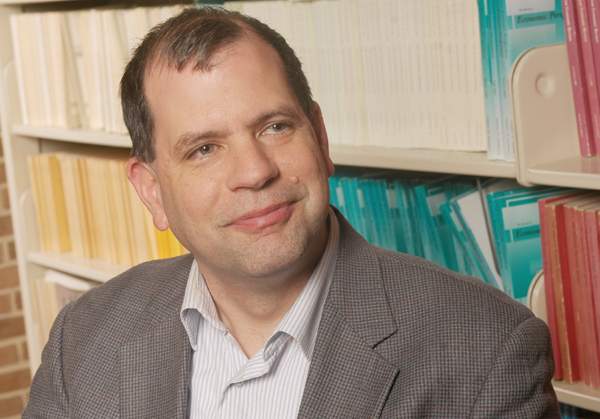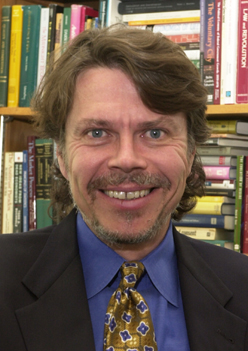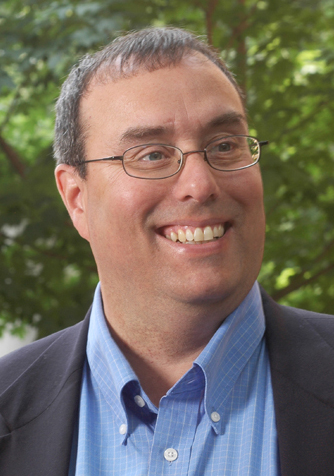Mason Economists Practice Their Own Brand of 'Freakonomics'
June 11, 2007
 Tyler Cowen, who directs Mason's economics think tank known as the Mercatus Center, has his own definition of Freakonomics: “using economics and data analysis to explore topics that are not normally talked about.” |
By David Driver
A few years ago, economics professor Alex Tabarrok walked into his colleague Tyler Cowen's office with an idea. Tabarrok suggested to Cowen, director of Mason’s economics think tank known as the Mercatus Center, that they should write a textbook together.
However, Cowen had another idea: They should work together on an Internet blog. And that is how Marginal Revolution was born. Since its beginning in 2003, the blog has had nearly nine million visits. Cowen, who generally posts three to four entries a day, is often stopped in airports by total strangers who say they admire his daily blogs.
He says the site even helped him land a side job writing a monthly column in the New York Times.
“It is not an intellectual step-down,” Cowen says of blogging. “I think a lot of academics do not feel that way. If you blog and make a mistake, the world lets you know in 10 minutes.”
Spreading Economic Ideas to a Broader Audience
At least eight other Mason economics faculty members are regular bloggers. One of them, Peter Boettke, who blogs at austrianeconomists.typepad.com, says someone told him it seemed that two of every three economics bloggers were from Mason. Though that is an exaggeration, the Mason economists have made an imprint.
“We have a group that wants to reach a broader audience,” Cowen says of his fellow economist bloggers. “Good ideas rise to the top and get more readers.”
 Donald Boudreaux |
Boudreaux gives his take on blogging: “It is not a diversion from scholarship. It is a complement to scholarship. When you blog, you see interesting questions [from readers] that can be potential topics for future research. ”
He adds, “We have to be careful what we say. It is widely read. Because of that it makes us careful scholars.”
Other Mason bloggers from the Economics Department include Bryan Caplan, who blogs with adjunct Arnold Kling at econlog.econlib.org, and Robin Hanson (OvercomingBias.com).
The economists' engagement with the public through blogs ties in nicely to themes raised in the 2005 bestseller, “Freakonomics: A Rogue Economist Explores the Hidden Side of Everything.” The book was written by University of Chicago economics professor Steven Levitt and journalist Stephen Dubner.
The book analyzes diverse and controversial topics from an economic perspective. For example, the authors posit that Roe v. Wade may have helped reduce crime in the 1990s, and they present evidence that Japanese sumo wrestlers “throw” certain matches. They explain why crack dealers still live at home with their mothers and how real estate agents in the Chicago area make more money when they sell their own homes. They even examine how a child’s name may or may not play a role in their future success or failure.
“…If there is no unifying theme to Freakonomics, there is at least a common thread running through the everyday application of Freakonomics,” the book's authors wrote in the epilogue. “It has to do with thinking sensibly about how people behave in the real world. All it requires is a novel way of looking, of discerning, of measuring. This isn’t necessarily a difficult task, nor does it require super-sophisticated thinking.”
Cowen, whose most recent book is “Discover Your Inner Economist” and who has written about the economics of the arts and the economics of fame, has his own definition of Freakonomics: “using economics and data analysis to explore topics that are not normally talked about.”
“That is very much in part what the Mason program has been about since it started: taking economics and applying it to law, taking economics and applying it to politics,” adds Boettke.
Freakonomics in Practice
Boettke says that looking for economic realities below the surface is an approach he's using in his current research project on underdeveloped countries, Enterprise Africa.
 Peter Boettke Photos by Evan Cantwell |
Recently, Boettke has made several trips to the Gulf Coast to study the emergency response to Hurricane Katrina.
“The civil society response — churches, volunteer associations, neighborhood associations — may have been under-appreciated in how robust they were,” he says.
“Most of the computer simulations show that many more deaths should have occurred. We consider [the response to Katrina] a major public failure, but the number of deaths was very low.”
Boettke adds, “Either it wasn’t a failure, or there was someone else that filled in the gap. I think the unwritten story there is the tremendous civil society organization. People bucked the system and got around, and the churches were the main vehicle for that.
“The real heroes of New Orleans are not the official responders. It is church leaders and yacht clubs that went in and got people out. It is an amazing story, and we want to document that civil society response.”
